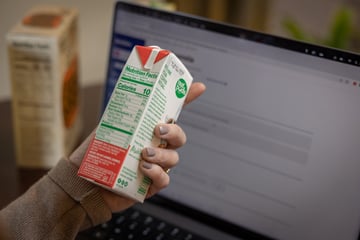When it comes to accurate labeling of food and supplement products, there’s no room for error. The food industry has a responsibility to keep customers safe and informed, and this is perhaps more relevant than ever with the rise of the ever-conscious consumers. As a result, government regulations on food product labeling are trying to keep up with consumer expectations by creating new guidelines for food and beverage manufacturers.
In April 2023, the Food Labeling Modernization Act (FLMA) of 2023 was re-introduced on the floor of House and Senate and could be just a couple votes and a signature away from becoming codified law. The Act, if passed into law, would require the Secretary of Health and Human Services to establish a series of changes, including:
- A standardized front-of-package (FOP) labeling system for all food products with nutrition labeling
- Clearer definitions and guidelines for the use of “natural” and “healthy” in food products labeling
- And establish guidelines for online food and beverage products to follow Nutrition Facts panel ingredients and allergen requirements, among other key points.
The FLMA was first introduced in 2013, and since then, the industry has experienced significant (and necessary) improvements when it comes to labeling requirements for foods and allergens, but there is certainly opportunity for significant impact with the potential passing of FLMA of 2023. In this piece, we outline the major provisions of the FLMA of 2023, how it will impact the industry, and what businesses can do to proactively prepare for this proposed change.
The Food Labeling Modernization Act of 2023
The Food Labeling Modernization Act of 2023 – combined from the House and Senate into H.R.2901 – has been introduced to the U.S. House of Representatives and proposes additional labeling requirements for the food industry in an effort to guide consumers to make more informed, healthy choices about the food they’re purchasing. To move forward, the bill will need to be passed in the House and the U.S. Senate, ultimately then being signed by President Biden to become a law.
The FLMA of 2023 covers:
- Introducing front-of-package labeling requirements – including symbols – to provide consumers with easier access to product information.
- Requiring product labels to include when high levels of sodium, added sugar, or saturated fat are present in foods.
- Applying new requirements for ingredient lists on package foods for better allergen awareness and ingredient transparency, like disclosures for products with gluten-containing grains or high levels of caffeine.
- Redefining “healthy” claims and creating a definition for “natural” claims in an attempt to undercut deceptive food product marketing, even requiring products with whole grains to declare how much whole grain is actually in the product.
- Providing guidance for grocery eCommerce, meaning consumers will have access to the same product information online for products, just as they would in stores.
How Companies Can Prepare Today
The Food Labeling Modernization Act of 2023 has the potential to shape the complexity of how the food industry approaches labeling. We’ve seen other countries, like Mexico and Canada, implement guidance for front-of-label package labeling and ingredient lists. However, if passed, FLMA 2023 would implement mandatory labeling regulations we haven’t seen yet in the U.S.
As the Act awaits a vote or veto, companies can (and should) be taking action now to prepare. We suggest the following:
- Keep a pulse on the news. While we’re still waiting to hear more about what’s yet to come with FLMA 2023, it doesn’t hurt to be prepared. Make sure you are keeping up with the latest industry news – we offer a regular Regulatory Roundup on our podcast, Transparency Talk with Trustwell – and the updates on this bill. Share the news with your team so they can understand the impact it will have on labeling practices if passed. Take time to assess current practices or protocols – are there any gaps that could lead to non-compliance? If changes need to be implemented, who will be responsible for what, and when?
- Invest in technology to help with food label formulation or reformulation. While labeling rules and regulations may continue to evolve, there are solutions available that can help your company stay ahead of the game. Genesis Foods, our formulation and labeling solution, offers built-in compliance guardrails to help your business align with FDA guidance, automate time-consuming labeling processes, and automatic updates when food labeling regulations change. And if your food products need reformulation, Genesis Foods’ built-in nutrient calculations, ingredient database, and automated label creation can streamline the entire process.
- Partner with industry experts to help. Regulatory changes can be daunting, but they don’t have to be. If you’re looking for guidance or advice in the food and supplement labeling space, our consultants are ready to help.
For more on how Trustwell can help you improve food transparency and safety across your business, connect with us today.
Other posts you might be interested in
View All Posts
Product Formulation
12 min read
| June 21, 2023
How to Create Accurate Allergen Declarations and Ingredient Statements with Genesis Foods
Read More
Food Labeling
11 min read
| May 30, 2023
Simplify Label Compliance with Genesis Foods
Read More
Trustwell News
6 min read
| June 24, 2025

